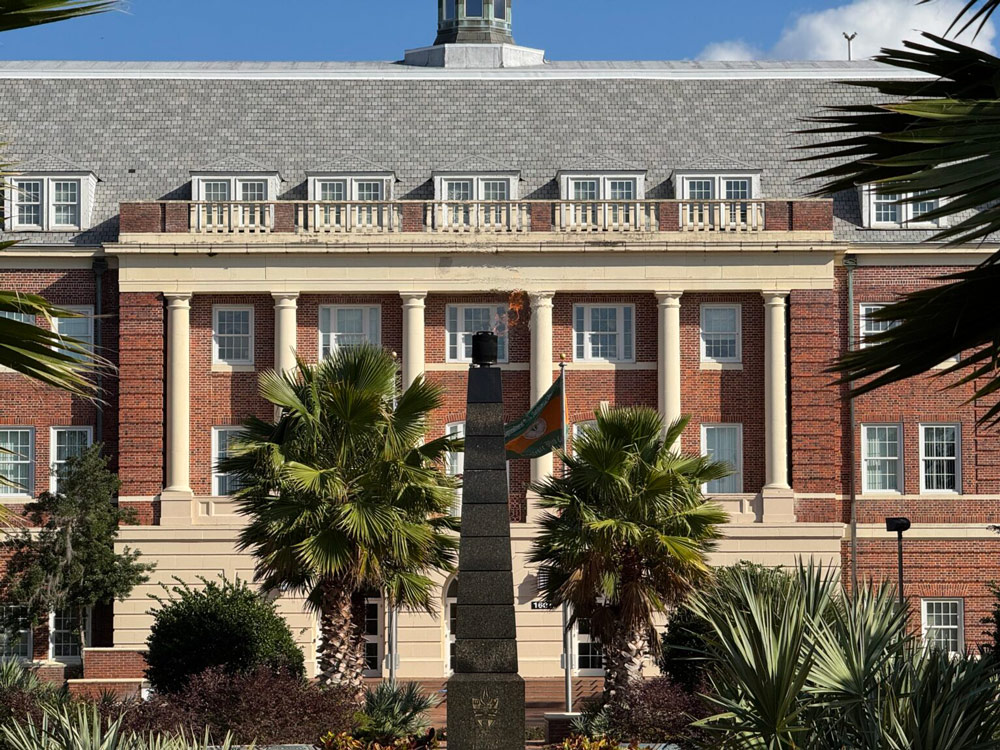
Gov. Ron DeSantis said on Friday that the state’s universities and colleges shouldn’t admit students lacking permanent legal status.
Come July 1, university and college students who attended Florida high schools but live in the state without legal permission will have to pay out-of-state tuition under a law, SB 2-C, DeSantis signed Thursday.
“I don’t think you should be admitted to college in Florida if you’re here illegally, but to give in-state tuition was just a slap in the face to taxpayers,” the governor said during a press conference in Ponte Vedra Beach, where he promoted his budget recommendation to increase pay for law enforcement and firefighters.
The provision rolling back the 2014 bipartisan measure ensuring in-state tuition for immigrants who grew up in the state but don’t have legal status garnered ardent criticism in the six hours of debate and questions before the Republican-led Legislature passed SB 2-C. Even some South Florida Republicans in the Senate voted for an amendment from the Democrats that would have allowed immigrants currently paying in-state tuition to finish their studies for the same rate.
 “For those students who are currently enrolled, the vast majority of them — they will drop out of school,” predicted Orange County Democratic Sen. Carlos Guillermo Smith on Thursday. “You have priced them out of higher education. You have priced them out of getting a degree.”
“For those students who are currently enrolled, the vast majority of them — they will drop out of school,” predicted Orange County Democratic Sen. Carlos Guillermo Smith on Thursday. “You have priced them out of higher education. You have priced them out of getting a degree.”
The average yearly cost of in-state attendance to Florida’s public universities is $22,464, according to the Florida Policy Institute. In-state tuition costs around $3,000 for Florida’s community colleges and $6,000 for public universities.
Brevard County Republican Sen. Randy Fine, who for years had been trying to repeal the in-state tuition waiver, has also filed a bill, SB 244, to ban public universities and state colleges with an acceptance rate lower than 85% from enrolling students lacking legal immigration status.
It’s unclear how far the measure will go during the regular session starting on March 4 because it doesn’t have a House companion yet and Fine is expected to win a congressional race on April 1.
Kids have a constitutional right to k-12 schools, even if they lack legal immigration status
The governor also criticized a 40-year-old U.S. Supreme Court decision guaranteeing kids’ access to public schools regardless of their immigration status.
“That was a bad decision,” DeSantis said. “Maybe they’ll reverse that or reevaluate it, but as of now, we’re stuck with it.”
Tennessee, another state where the GOP controls the Legislature and the executive branch, is considering allowing school districts to refuse enrollment to students without permanent legal status. The Florida Republican senator leading the immigration enforcement proposals, Joe Gruters of Sarasota and Manatee counties, told reporters on Wednesday that such a measure wouldn’t happen in Florida.
Meanwhile, immigration and public education advocacy groups have bashed the rhetoric coming from Republicans against immigrant students whose parents brought them to the country without legal authorization.
“We do not want to speculate, nor do we want to fan the flames of fear in a community that is already vulnerable. But we will reiterate that every child in Florida is entitled to a public education regardless of immigration status, per the U.S. Constitution,” the Florida Education Association wrote in a statement Wednesday. “An ICE raid on schools for any other reason, political or otherwise, is not only harmful to every child in our care but is blatantly un-American.”
–Jackie Llanos, Florida Phoenix





























Al says
If you’re not here legally then how can you be a resident? If you get a degree how do you get a job without a SS# ? You lie on your application or you steal an identity, great start as that’s a crime. Every child born to Americans has a SS# but why burden the illegals with a requirement all the rest of us have. These students shouldn’t even be allowed in school without a student visa. How many minority Americans of all races are shut out of these universities so that illegals can get a discount rate?
What the liberal crybabies should do is pool their money and pay the difference for these students. I bet you don’t feel so strong about it when it’s your money, but just waste everyone else’s.
R.S. says
DeSantis is so stupidly short-sighted. Many if not all European universities offer tuition-free higher education to anyone in the whole wide world who wants to learn enough of the local language to benefit from an education there. It’s an investment in the planet and in good relations with other denizens on this blue orb. What DeSatanis is offerening here is a view of a kind of hyper-isolationism that is completely out of wack with any basic human decency or basic human morality. It already makes no sense to charge anyone a fee for making an effort to invest brainpower in humanity’s future; now we want to keep some part of humanity from investing their brainpower? What’s his goal? Keep ’em stupid for easier manipulation?
Deborah Coffey says
What does history tell about what happened to Fascist haters? Did their cruelty and hatred ever end well for them and their followers?
me says
DeSantis lies to the voters that he is a Christian. True Christians don’t discriminate but try to resolve things intelligently and humanely.
Land of no turn signals says says
See something say something.